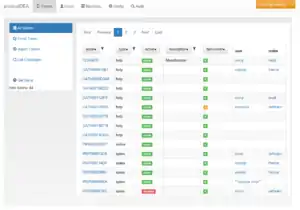PrivacyIDEA
privacyIDEA is a Two Factor Authentication System which is multi-tenency- and multi-instance-capable. It is opensource, written in Python and hosted at GitHub.[1]
 View of authentication devices (tokens) | |
| Developer(s) | privacyIDEA project / NetKnights GmbH |
|---|---|
| Stable release | 3.4
/ 8 September 2020 |
| Repository | |
| Written in | Python |
| Operating system | Linux |
| Type | Two factor authentication |
| License | AGPLv3 |
| Website | www.privacyIDEA.org |
Fields of use
privacyIDEA provides an authentication backend for various kinds of applications (including SSH, VPN, as well as web applications such as ownCloud[2]). Thus it is meant to replace classical proprietary Two Factor Authentication systems such as RSA SecurID or Vasco. It supports Single sign-on via SAML. It is also possible to login with a second factor to Windows desktops using a privacyIDEA Credential Provider.[3]
Installation
privacyIDEA is running on-premises as a web application on a Linux system. It can be set up quickly and easily.[4] It can run on Debian, Ubuntu, RedHat and also as App from the AppCenter on the Univention Corporate Server.[5]
Authentication devices
privacyIDEA supports a wide variety of authentication devices.[6] Amongst those are hardware tokens like Feitian C200, the Yubikey by Yubico or other U2F devices. Also many smartphone apps compliant to HOTP and TOTP like the Google Authenticator are supported.
References
- "privacyidea/privacyidea: multi factor authentication system (2FA, OTP)". GitHub. Retrieved 2016-11-23.
- "ownCloud 9.1 comes with integrated Two-Factor-Authentication". ownCloud. Retrieved 2016-07-22.
- "privacyIDEA Credential Provider". NetKnights. Retrieved 2016-04-12.
- "Howto install privacyIDEA authentication system". TechReplublic. Retrieved 2016-07-22.
- "privacyIDEA in the Univention AppCenter". Univention. Retrieved 2016-07-22.
- "Supported Tokens". privacyIDEA. Retrieved 2016-07-22.
